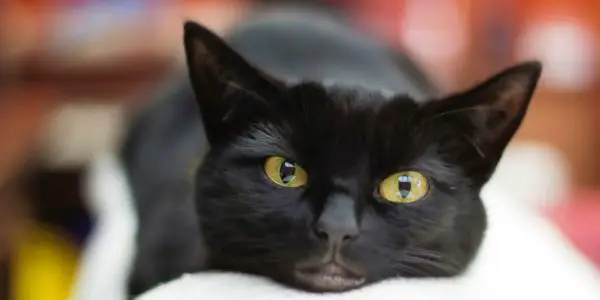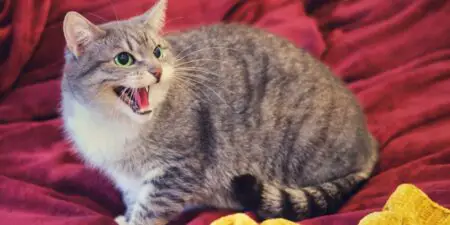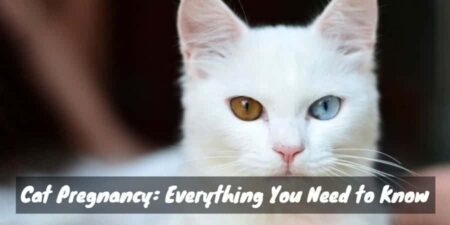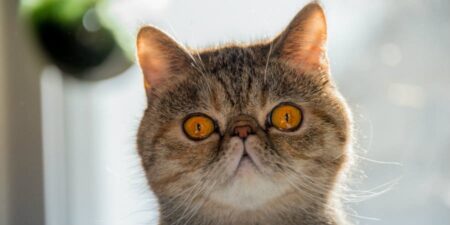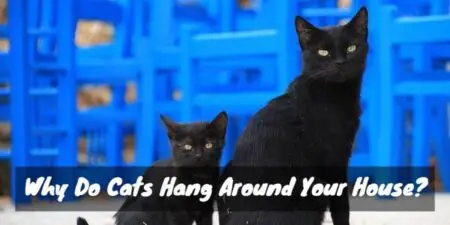Ever wondered why black cats often get a bad rap? They’re featured in movies, festive decorations, and tales passed down through generations as symbols of misfortune. Just picture the iconic image of a black cat hissing against the backdrop of a full moon during Halloween. They’ve become synonymous with bad luck across numerous cultures.
Despite all our advancements in understanding and appreciating the world around us, it seems we still can’t shake off the dark shadow cast on black cats. This bias is sadly evident in animal shelters, where these dark-furred felines are adopted 50% less often than their differently colored counterparts.
But why have these fluffy, harmless pets been saddled with such a sinister reputation? Are they really as unlucky as we’ve been led to believe? Let’s unravel the mystery of the much-maligned black cat.
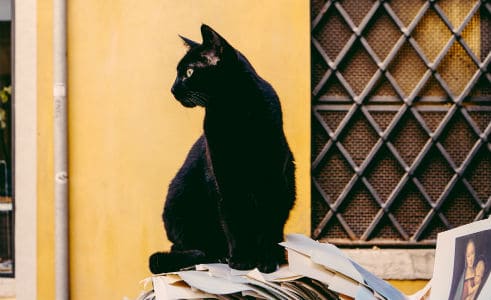
Not Always Shunned
Many historical occurrences and mythologies feed into the unlucky black cat beliefs. Western culture seems to have taken these stories and run with them, as there really isn’t a reason for these views. In fact, black cats are considered lucky in many countries like Japan and parts of the United Kingdom.
[amazon bestseller=”black cat collar”]
Egypt
Thousands of years ago, cats were domesticated in the Middle East and in Egypt. They were given the duty of protecting food stocks from rats and mice that carried some pretty foul diseases. Their life-saving service was not overlooked, and they were greatly respected and revered in these countries.
In Egypt, Bastet was a goddess who was part feline. She was said to grant good fortune to those households that protected and cared for cats. This showed that the status of cats was well beyond just lucky little four-legged helpers. They were considered little incarnations of the gods and were to be worshipped.
Cats were highly protected, and it was a crime to kill one, even if it was accidental. They were so loved and respected that they would often join their owners in death by being mummified and buried alongside them. When a cat died, their families mourned them as an important member of their family.
Europe
In England, you would often find black cats on ships for luck. Pirates thought black cats were little oracles that could foretell the fate of their ships. If the cat walked onto a sip and remained, they were in for a streak of good luck. However, if it came on board but did not want to stay, it was a sign the ship’s fate would not fare so well.
Black cats were also used by the wives of fishermen as good luck charms to ensure their husband’s safe return from the sea. Other European cultures believed that a black cat approaching you meant that it was bringing you good luck.
In the English Midlands of Great Britain, a black cat may be given to a new bride to celebrate her marriage. They are thought to bring luck and prosperity to the new home and bless the newlyweds with happiness.
Japan
Even today, cats are considered to be symbols of good luck and prosperity in some Asian cultures. If you have ever visited a Japanese-owned establishment, you may have noticed Maneki Neko smiling at you from the counter. These little cat statues, in white or black, wave in the good fortune with one paw up.
It is also not odd to find a black cat taking up residence in the homes of single young women in Japan. This is because they are thought to bring luck in love by attracting many suitors.
Black cats are welcomed into Japanese homes because they are thought to bring good luck in general. Many place their beds towards the north side of their house to help ward off evil spirits and bad luck.
They are also prone to upholding the adage, “You scratch my back, and I will scratch yours.” Not literally, but if you care for a black cat and keep him content and safe, he will do the same for you by scaring off evil spirits, negative energy, and disease-carrying rodents and by cuddling with you, eliminating the need for an extra blanket. (Hey, that’s less laundry.)
France
French peasants believed that a black cat would lead them to treasure if released at a five-road intersection. They were also considered good luck and attracted wealth when cared for and respected. Thus, many households will give the cat the first bite of dinner, ensure that they live comfortably within the home, and have a home after the passing of the owner.
[amazon bestseller=”black cat shirt”]
Religious Contribution
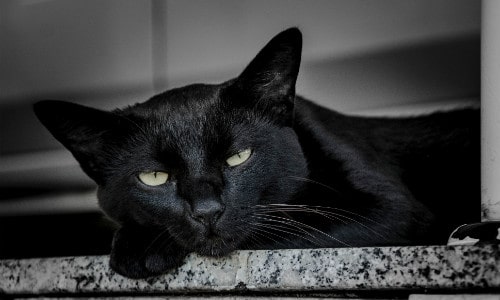
So when exactly does good luck do a 180-degree turnabout, transforming black cats into something spurned? Well, the origins of superstitions regarding black cats can be traced back to religious influences.
Today, most religion centers around the belief in one god. However, this was not always the case. Before monotheism became widespread, people across the globe worshipped many gods, often implementing the use of idols in their religious practices.
Since both the worship of many gods and idolatry are considered evil in modern religion, these polytheistic religions were also considered evil and linked to demons. Christians even went to great lengths to destroy statues and idols, fearing that they housed evil spirits. Since Egyptians worshipped many gods and many of their idols were black cats, the association between black cats and evil was not a far leap to make.
This religious fear of black cats continued. One example is Pope Gregory IX. He actually created a religious document that condemned black cats as manifestations of the devil. That was sure to influence many a churchgoer.
During the Dark Ages, several Christian holiday celebrations encouraged followers to burn the little four-legged demons in bonfires. The black cat would forever be looked at as a negative symbol because of this influence.
As the years progressed, the persecution would taper off a bit, but the omen of bad luck would continue to follow these poor critters. Some organizations even took on the symbol of the black cat to represent their non-traditional and controversial beliefs. With a sinister history, these cat symbols were used to give groups such as anarchists a way to show their not-so-pleasant intentions.
A Bewitching Association
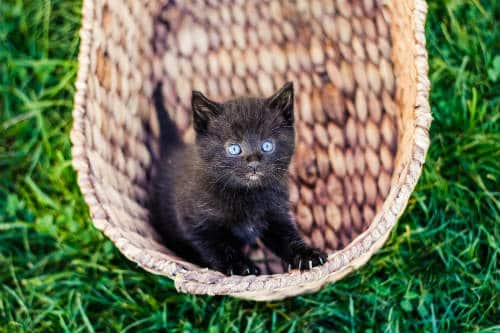
Still, the history of the unlucky black cat is most solidly grounded in the association between them and witches. There are many examples of this association throughout the world and in many cultures.
One example is in Celtic mythology, the Cait Sidhe was a fairy or witch that took the form of a black cat. According to folklore, the cait sidhe had the ability to steal a human soul before the gods could claim it. Therefore, the Celts would engage in many activities and rituals that would help distract the cait sidhe to give the gods ample time to claim the soul.
The Norse god Freya would often be seen being pulled in a chariot by two black felines. After seven years of service, she rewarded them by giving them human form as witches. This may have helped feed into the belief that witches can shapeshift into cats.
The Peak of Fear
During the Middle Ages in Europe, superstitions abound. Religious influence, a deficiency in scientific understanding, and a human’s innate nature to try to explain the unknown helped to fuel already established beliefs about black cats and other forces of nature. These unsubstantiated superstitions caused many groups of people to hunt down black cats in an attempt to eradicate them.
This persecution of black cats rested on the belief that they were close cohorts of witches. Black cats were accused of being sent by the devil himself to assist witches with their evil endeavors. This also led to people being included in the persecution since witches were thought to take on the form of black cats in order to sneak silently into the darkness undetected.
Hundreds of thousands of individuals were persecuted and accused of witchery throughout Europe. Black cats were being eliminated to the point that many believe their absence was a big factor in the spread of the Bubonic Plague. The disease would take more than 25 million lives over a short period of time.
Fears Reach America
When people began to immigrate to America, they brought their religious beliefs along with them. Amongst these beliefs were the superstitions, including the unlucky black cat. Puritans still believed that evil lived even within their own community, and it was not long before accusations of witchery started with the poor black cats once again caught up in the mess of it all.
So, once again, witch-hunting became a normal thing. In fact, it was a very profitable occupation. Many people were even falsely accused by others as a way to seek revenge on them. Thus, the persecution of those suspected to be involved in witchcraft and their black cat familiars continued throughout America.
The Black Cat Today
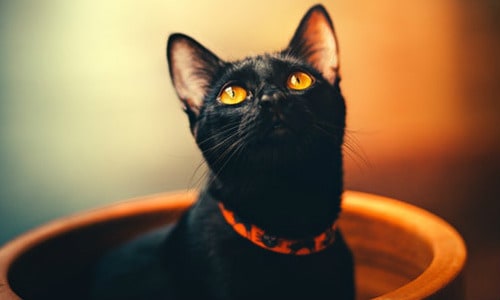
The black cat’s history is full of tumultuous shifting between admiration and fear. They may have been easy targets simply because of their color. Black is often associated with death, evil, and darkness. Or maybe their nocturnal nature made them a good scapegoat.
Regardless of why they specifically were handed their unlucky fate, we should know it is unsubstantiated by now, shouldn’t we? Unfortunately, it may take a long time before they can exist without the stereotype they have unfairly been stuck with.
We may have settled down and become more evolved as humans, but many cannot seem to shake those old-time superstitions. Even today, many people fear a black cat that crosses their path or are suspicious of their neighbor who keeps one as a pet. Black cats still help spook up Halloween celebrations and horror films.
Many shelters do not adopt black-colored kitties during the fall season celebrations for fear they may be sacrificed. They are also not adopted out as quickly, often spending 13 percent longer in a shelter than other cats. All over, a few individuals gave them a bad rap and influenced countless others to follow suit.
[amazon bestseller=”cats treats”]
One day black cats may fully escape their negative connotation, and anything witch-like will just be for novelty. For now, appreciate them for what they are- a cuddly and forgiving family member who has forgiven us for what they have been put through.
Are Black Cats Really Bad Luck? (Video)
"In ancient times cats were worshipped as gods; they have not forgotten this."
-- Terry Pratchett

